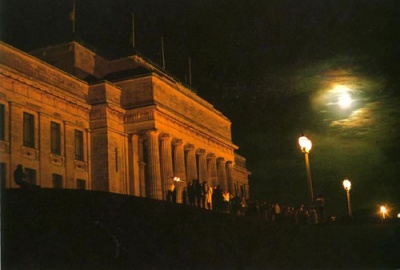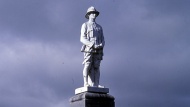Articles
Anzac Day

First observed in 1916, Anzac Day - 25 April - commemorates those killed in war as well as honouring returned servicemen and women. The ceremonies that are held at war memorials across the country, or in places overseas where New Zealanders gather, are rich in tradition and ritual.
-
Page 3 – The ceremony
The Anzac Day ceremony of 25 April is a form of military funeral and follows a particular pattern. The day's ceremonies have two major parts: one at dawn and another, more
-
Page 5 – A sacred holiday
Anzac Day became a public holiday and took on new meaning in a time of peace. It became a time to express sorrow, not glorify war, and was a sacred day that had a secular tone
-
Page 7 – Modern Anzac Day
Each generation of New Zealanders redefines Anzac Day to suit the mood of the times, but the last 40 years have been a time of much redefinition.
Anzac Day in the Pacific

Armistice Day was the initial focal point for commemorations in the Cook Islands and Niue after the First World War. But because men from both countries had served in the New Zealand Expeditionary Force, observances gradually shifted to Anzac Day in April
- Page 3 - The growth of Anzac DayBy the end of the Second World War military commemorations in the Cook Islands and Niue centered around Anzac Day. Services in both countries followed the pattern of those in New
-
Main image: Dawn service, Anzac Day, Auckland 1986
The dawn service at the Auckland War Memorial Museum, 25 April 1986. The dawn service became widely adopted New Zealand in 1939 after some Australian veterans had attended a similar service in Sydney the previous year.


